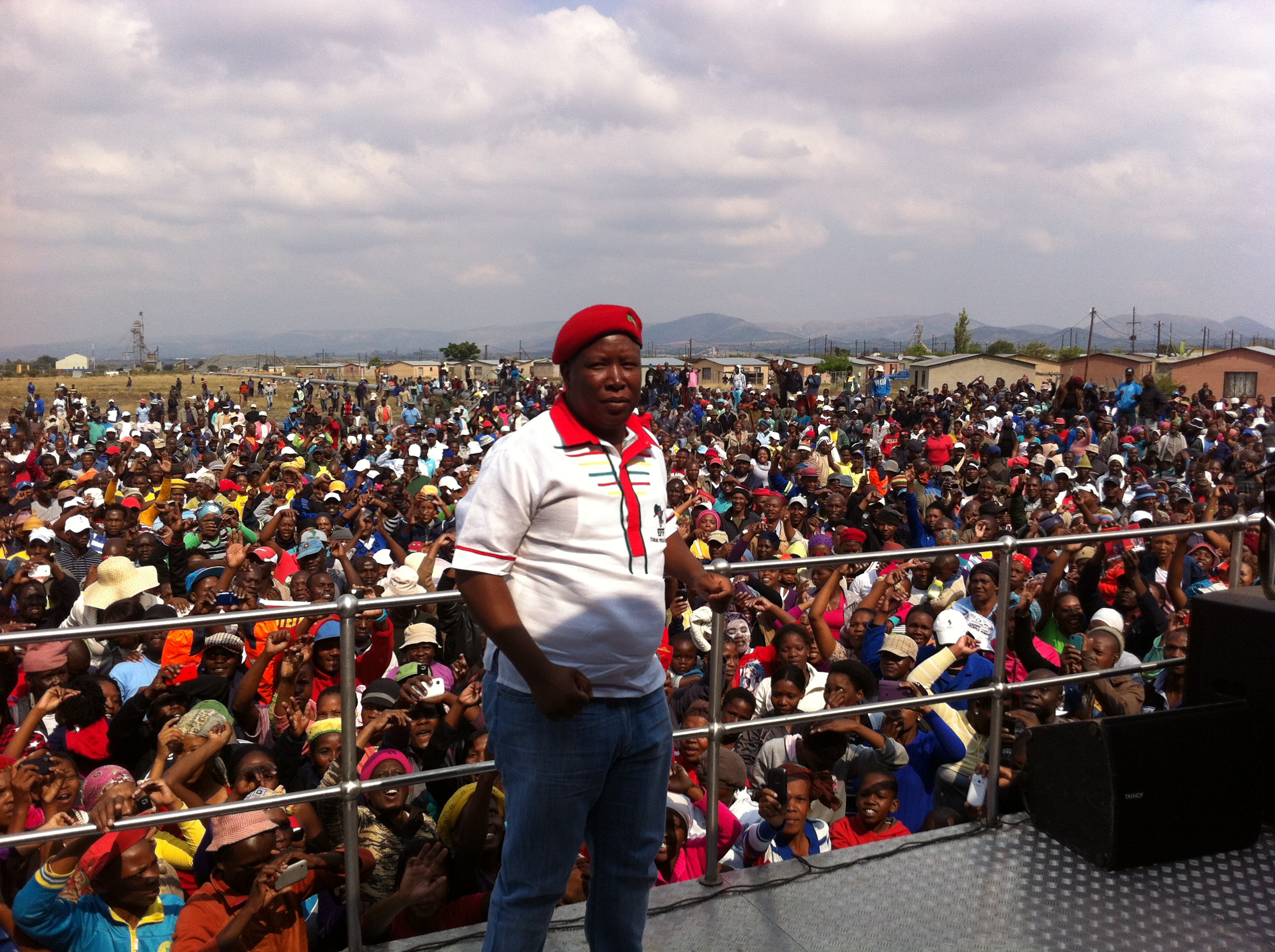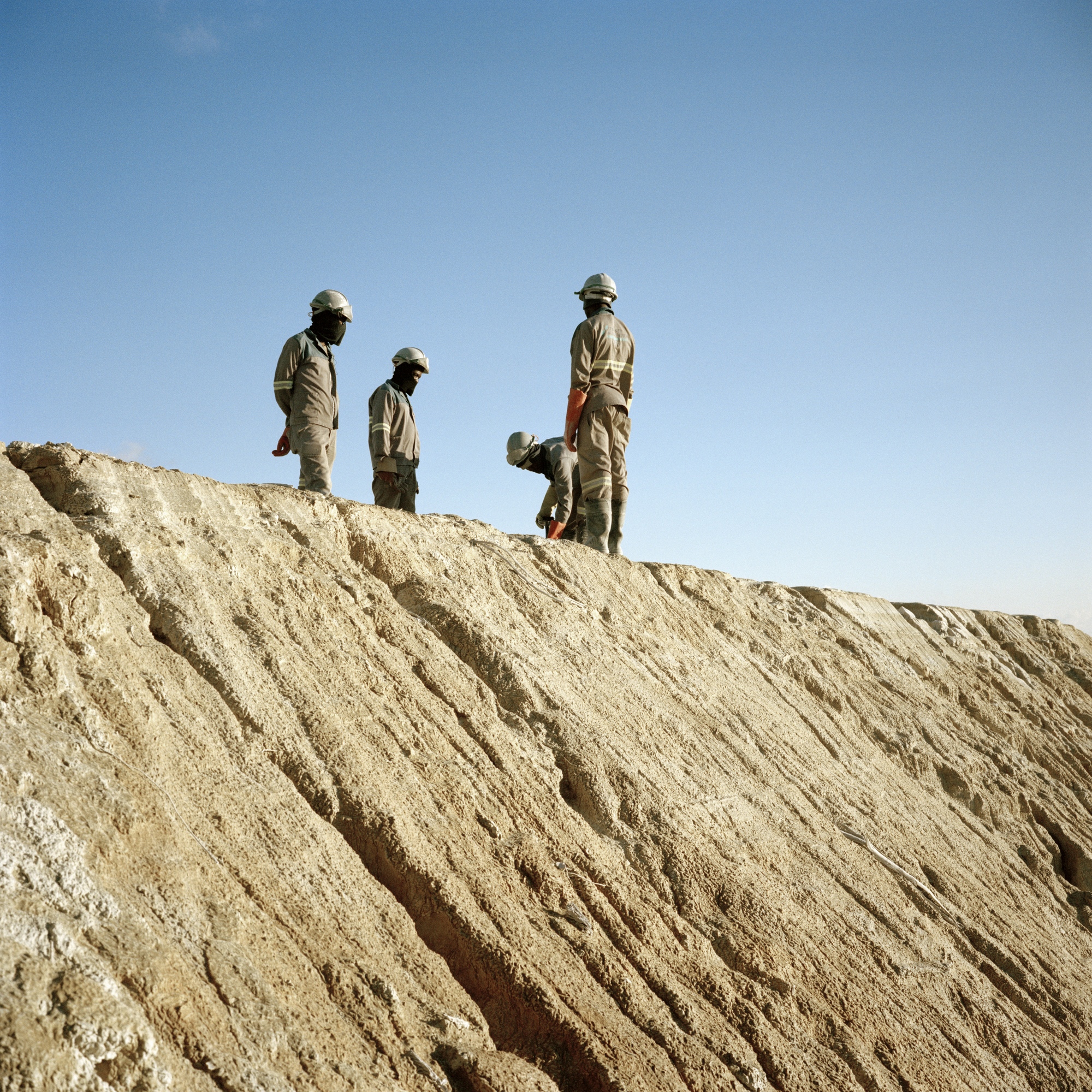
FREEDOM PARK, South Africa — Sophie Batshegi is rapidly approaching 50, but you wouldn't know it from her dancing. One by one, younger rivals attempt to out-grind, out-jump and out-jive her on the stage; one by one, they slink off back down the steps, while Sophie continues bouncing triumphantly to the music. The compère declares her to be victorious and the crowd goes wild. "And who are you going to vote for on Wednesday?" he asks, thrusting a microphone into Sophie's face. She doesn't hesitate. "Juju!" she shouts. Below, onlookers roar their approval.
Welcome to the Juju show, coming soon to a disenfranchised mining town near you. This is Freedom Park, an impoverished community comprising mainly of shacks, and today – on the eve of South Africa's general elections – many of its inhabitants have drifted over to a stretch of scrubland on the edge of the settlement, at the centre of which stands a large red bus with the initials 'EFF' painted across its sides. The acronym stands for the "Economic Freedom Fighters," a nascent political party that is threatening to redraw South Africa's ossified political landscape with a flourish.
Few other parties have made it out here, to the restive underbelly of the country's supposed post-apartheid success story; certainly not the African National Congress (ANC), whose local branch offices have been torched and whose ministers no longer dare to set foot in the area. Officials cited "violence" and "anarchy" as the reason behind the last minute cancellation of a long-scheduled campaign stop by President Zuma nearby; residents here argue that if ANC bigwigs are no longer welcome, it is only because the party has become, in their eyes, such an agent of exclusion itself: exclusion from the fruits of economic growth, exclusion from the protections workers expect against powerful mining houses, exclusion from the post-apartheid dream that democracy was supposed to deliver.
"We are the poorest of the poorest, we are from these families, we feel their passion," Israel Sizani, the EFF compere – bedecked gloriously from head to toe in red velvet – told me later. "I want to quote one thing that our icon Madiba [Nelson Mandela] said to us. He said to us that if the ANC ever does to you what the apartheid system did to you, you must do the same thing to the ANC that you did to apartheid. And that's what we're doing today. We are not betraying Mandela, we are following in his footsteps."
The EFF's self-styled "commander-in-chief" is the firebrand former leader of the ANC's Youth League, Julius "Juju" Malema, who eventually roars up to the rally and bounds on stage in an explosion of choreographed razzmatazz. Like his ANC counterpart Jacob Zuma, Malema has been the subject of multiple corruption allegations, and in common with most parties across the South African political spectrum the EFF's funding sources remain murky. Yet however hypocritical it may be, Malema's rhetoric – about the broken promises of the post-apartheid era, about the black children still going to bed hungry and the black workers still perishing in mine shafts a full two decades since the advent of democracy – resonates powerfully here.
"The anti-apartheid heroes didn't die for you to live in a matchbox home without flushing toilets," he boomed from the Freedom Park stage, provoking prolonged cheers in the audience. Many of the onlookers are perched on pipes that ferry water and energy to the platinum mines while leaving their homes without power or taps; on the edge of the scrubland sits an armoured police vehicle, its occupants watching on warily.
The EFF, as a new party boasting only a fraction of the resources of the ANC and absolutely none of its deeply-embedded resistance heritage, had no expectations of winning these elections. In South Africa, where the ANC has secured more than 60% of the ballot at every national vote since 1994, drama on election day is rarely to be found anywhere but the margins. Yet by the time results were confirmed later that week, Malema had gained enough support to push his new political vehicle into third place and nab 25 seats in parliament.
One of those seats will be occupied by Primrose Sonti, a housewife and shack-dweller in Marikana – and, like many EFF stalwarts, a former ANC activist. "Our government, these [mining] companies, they think the cow and the chicken is better than us," she told me just before the election. "Democracy? I just know the name, democracy is not something I can see."
With Malema capturing less than 6 percent of the national vote, ANC officials will not be losing sleep over the prospect of an EFF government assuming power any time soon. But calm waters on the surface of South Africa's formal electoral apparatus are a poor guide to the eddies and currents swirling below. From the energy at Freedom Park that bright winter's afternoon, it was clear that something is happening – something that to date remains hard to define, but which involves difficult questions about the real shape of post-apartheid liberation, the real limits of democratic empowerment and the real injustices of the economic status quo, something that could yet transform South African politics in radical and as yet unpredictable ways.
The ANC's election slogan was that it had a "good story to tell" about its stewardship across the first two decades of democracy. Here in the mining belt though, Sophie and Primrose and many others have a very different story to tell – and to them, it feels like only Juju and the EFF are prepared to listen.






